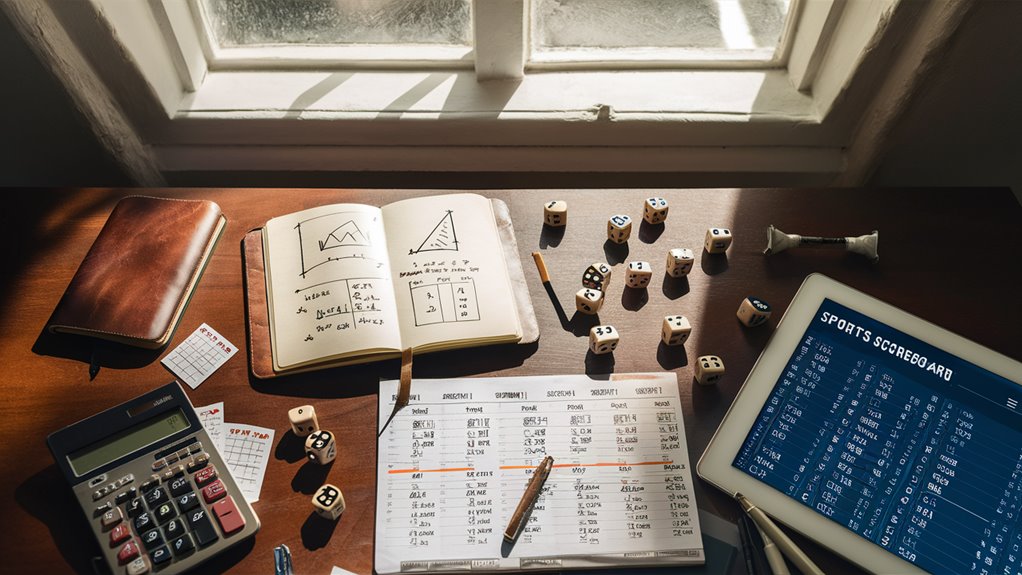Listen, beating the odds in sports betting isn't about following your gut or relying on lucky guesses. You know how most people place their bets? They look at basic stats like wins and losses, maybe check who's been hot lately, and call it a day. But here's the thing: if you really want to succeed, you need to dig deeper.
Think of it like solving a complex puzzle. Sure, you could try random pieces and hope they fit, or you could develop a systematic approach. That's where the real magic happens, with probability theory, regression analysis, and all those fancy performance metrics that most casual bettors never bother to learn.
Well, you might be wondering, "Isn't this getting a bit too technical?" Not really. Let's break it down. Imagine you're tracking a basketball team's performance. Instead of just looking at their record, you'd analyze shooting percentages, player efficiency ratings, and even factors like rest days between games. Pretty interesting stuff, right?
The secret sauce is turning all this raw data into something useful. It's kind of like being a detective, looking for patterns and connections that others miss. While the average Joe is placing bets based on team loyalty or what the sports pundits say, you'll be making calculated decisions backed by solid statistical analysis.
So, if you're serious about getting an edge over the betting markets, it's time to roll up your sleeves and embrace the numbers game. Trust me, once you start seeing sports through this analytical lens, you'll never look at betting the same way again. Ready to dive into the world of statistical analysis?
Understanding Basic Probability Concepts

Let's dive into the world of probability, shall we? You know, before you can really get into sports betting, you'll need to wrap your head around some basic concepts that make all the difference between random guessing and smart wagering.
Think of probability as your best friend when it comes to betting. It's simply the chance of something happening, shown as a number between 0 and 1, or if you prefer, as a percentage. When you're looking at sports betting odds, what you're really seeing is probability in disguise.
Now, let's break down those tricky odds formats. With decimal odds (like 2.50), it's pretty straightforward. Just divide 1 by that decimal number, and voila, you've got your probability!
American odds might seem a bit weird at first. When you see a positive number, it shows what you could win on a $100 bet. Negative numbers? Well, those tell you how much you need to put down to win $100.
And if you're into horse racing, you'll run into fractional odds, which are just a simple way of showing your potential profit compared to what you bet.
Here's something really important: expected value, or EV for short. Think of it as your crystal ball for betting success.
The math is pretty simple, actually. Take your chances of winning and multiply that by what you'd win, then subtract your chances of losing times your bet amount.
If you end up with a positive number, you might be onto something good. Negative? Well, you might want to think twice about that bet.
Historical Data Analysis Methods

Let's talk about analyzing historical sports data, because it's actually pretty fascinating once you get into it. You know how they say numbers tell a story? Well, in sports betting, they tell quite a few.
First things first, you'll want to dig into those reliable databases to gather all the important stuff. Think head-to-head matchups, how teams perform at home versus on the road, and scoring patterns.
It's like being a sports detective, really, looking for clues in seasonal trends and how weather impacts games.
Getting organized is key here. Create some spreadsheets (nothing too fancy) to track what matters: win-loss records against the spread, whether games go over or under expected totals, and team stats that really make a difference.
Most folks find that looking at the last 3-5 seasons works best, but here's the thing: recent performance usually tells us more than older data.
Now, this is where it gets interesting. You'll want to play around with those numbers a bit. Look at how teams handle being the favorite compared to when they're underdogs.
Maybe check out their performance after losses, or when they've had a long break between games. Moving averages can help smooth out those weird statistical blips that pop up from time to time.
But here's the real deal: historical data is just one piece of the puzzle. Think of it as your foundation, but not the whole house.
Before you place any bets, make sure to look at what's happening right now with the teams. Are key players injured? Has the coaching staff changed?
These current factors can totally shake up what the historical trends suggest.
Key Performance Metrics

Let's talk about what really matters in sports betting analysis: finding the right numbers that tell the story. You know how easy it can get to feel overwhelmed by all those statistics, right? Well, we're going to break this down into manageable pieces.
First up, you'll want to look at both the basics and the fancy stuff that actually impacts how games turn out.
For team sports, think about the obvious stuff like how many points teams score, but also dig deeper into things like how well they protect the ball and use their possessions.
If you're betting on individual athletes, you'll want to check out their track record against specific opponents and how they handle different conditions.
Here's the thing, though. Don't just stick to win-loss records like most casual bettors do. You've got to get more specific with things like how teams perform at home versus on the road, and how badly they beat (or lose to) their opponents.
A really useful thing to look at is efficiency stats, which tell you how well teams use their opportunities. Take basketball, for instance, where points per possession can tell you way more than just total points scored.
Or in baseball, where on-base plus slugging percentage gives you the real scoop on a hitter's effectiveness.
Now, if you really want to step up your game, let's talk about some next-level stats. Things like expected goals in soccer, or that fancy DVOA thing in football (which basically shows how good a team really is compared to average).
These aren't just random numbers, they're actually pretty powerful tools that most people overlook.
Just remember, what happened last week probably matters more than what happened last season, since it better shows how teams are playing right now.
Regression Analysis in Sports

Let's dive into regression analysis, a fascinating tool that's revolutionizing sports betting. You know how sometimes you get that gut feeling about a game? Well, regression analysis takes that intuition and backs it up with solid data.
Think of it as your personal sports detective. It helps you connect the dots between different aspects of the game and figure out what really makes a difference in the outcome.
Want to know if your team performs better after a three-day rest? Or how much that star player's injury might affect the next game? That's where regression analysis comes in handy.
Getting started is pretty straightforward. First, you'll need to pick what you want to predict (like final scores or win percentages) and gather all the factors that might influence it.
Let's say you're looking at baseball. You might wonder how things like the weather, the opposing pitcher's style, or even the time of day affect your team's hitting. Cool, right?
Now, there's more than one way to crunch these numbers. Simple linear regression works great when you're dealing with straightforward relationships, like how quickly players get tired during back-to-back games.
But sometimes you need something more robust. That's when multiple regression comes in, letting you juggle several factors at once. And if you're trying to predict whether a team will win or lose, logistic regression is your best friend.
Just remember, these models aren't crystal balls. You'll want to keep testing them against new data to make sure they're still giving you reliable insights. The sports world is always changing, and your analysis needs to keep up with it.
Bankroll Management Through Statistics

Let's talk about bankroll management through statistics, shall we? You know how they say smart betting is all about the numbers? Well, it's absolutely true, and I'll show you why.
Think of your betting bankroll like a business investment. Just as you wouldn't throw all your savings into a single stock, you need to be strategic about how much you stake on each bet.
Here's the thing: start by figuring out your unit size, which should be around 1-3% of your total bankroll. This isn't just a random number, by the way. It comes from something called the Kelly Criterion, a fancy mathematical formula that helps you size your bets based on your edge.
Now, you might wonder how to track all this stuff. Well, it's pretty straightforward. Keep tabs on your ROI and winning percentage, just like you'd track your expenses in a budget. Over time, these numbers will help you fine-tune your approach and make better decisions.
Here's something interesting about volatility: watching your bankroll's standard deviation is like checking your heart rate during exercise.
If things get too erratic, you might need to slow down a bit. Maybe reduce those bet sizes or take a fresh look at your strategy. And please, write down everything, from how much you bet to the odds you got.
Look, we all hate losing streaks, right? That's why you need what pros call a stop-loss threshold. Set yourself some firm limits, like not losing more than 20% in a day or 40% in a month.
When you hit these numbers, take a breather. It's like calling a timeout in sports, giving you a chance to check what's working and what isn't.
Value Betting Calculations

Let's dive into the fascinating world of value betting calculations. You know how everyone wants to get ahead in sports betting? Well, it all comes down to understanding how to spot those golden opportunities where bookmakers might've miscalculated their odds.
Think of value betting like finding items on sale at your favorite store. Just as you know when something's priced lower than it should be, we can spot when betting odds offer more value than they should. Pretty cool, right?
Here's how to break it down: first, you'll need to convert those decimal odds into something more practical, like probability.
The formula's actually quite simple: just divide 1 by the decimal odds and multiply by 100. Let's say you're looking at odds of 2.50. That works out to a 40% probability according to the bookmaker.
But here's where it gets interesting. You'll want to do your own homework and figure out what you think the real probability is.
Look at past games, check team stats, consider player injuries, the whole nine yards. If your calculations show a higher probability than what the bookmaker's offering, well, you might just have found yourself some value.
Want to get really precise about it? There's this thing called expected value (EV).
The formula looks like this: take your probability times your potential win, then subtract the probability of losing times what you could lose. So if you think something has a 50% chance of happening at 2.50 odds, you'd calculate (0.50 x 1.50) minus (0.50 x 1.00), giving you 0.25.
When that number's positive, you're looking at a potentially profitable bet.
Power Rankings and Rating Systems

Let's dive into the fascinating world of power rankings and rating systems. You know how win-loss records only tell part of the story? Well, there's actually a whole lot more to figuring out which teams are truly the best.
Think of rating systems as super-smart calculators that crunch all sorts of numbers. They look at things like how badly teams beat their opponents, who they've played against, whether they perform better at home or away, and if they're on a hot streak. Pretty cool, right?
You've probably heard of some popular ones out there. There's ESPN's Football Power Index (FPI), which basketball fans swear by Ken Pomeroy's college rankings, and the classic Elo ratings that work across different sports.
But here's the thing: you can't just pick one and roll with it. To really get the most out of these systems, you'll want to follow several reliable sources and keep track of how well they predict actual games.
Some systems are all about offense and defense stats, while others care more about head-to-head matchups or what happened in past seasons. It's kind of like having different weather apps on your phone, each with its own way of forecasting.
Now, if you're thinking about using these for betting, there's a bit more to it. You'll need to turn those ratings into actual probabilities and point spreads, then compare them with what the bookmakers are offering.
But here's the catch: most public rating systems are already baked into the odds you see. So if you really want an edge, you might want to create your own system or mix and match different models in a unique way.
It takes some work, but hey, that's where the real advantage comes in.
Common Questions
How Do Weather Conditions Affect Statistical Predictions for Outdoor Sports Betting?
Let's dive into how weather really shakes things up in sports betting. You know how unpredictable outdoor games can be, right? Well, there's actually a whole science behind it.
Think about wind speed for a moment. Picture a quarterback trying to complete a precise pass while dealing with 20 mph gusts, or a soccer player attempting a long shot that suddenly curves off target. That's exactly why smart bettors always check the forecast before placing their wagers.
Temperature plays a huge role too. When it's freezing cold, players tend to move differently, muscles tighten up, and the game naturally slows down. On super hot days, fatigue sets in faster, which often leads to more mistakes late in the game.
Now, let's talk about rain and snow. Wet conditions can turn a high-scoring affair into a defensive struggle real quick. The ball gets slippery, the field gets muddy, and those fancy offensive plays? They often go right out the window.
Humidity might seem less obvious, but it's actually a game-changer, especially in sports like baseball where grip on the ball matters. High humidity can affect how far the ball travels and how pitchers control their throws.
Can Statistics Predict the Impact of Player Injuries on Betting Odds?
Let's dive into the fascinating world of sports betting and injury analysis. You might think predicting how injuries affect betting odds is like throwing darts blindfolded, but there's actually a pretty solid scientific approach to it.
Looking at the numbers, we can break this down into concrete patterns. Picture this: when a star quarterback gets sidelined, there's a ripple effect that goes way beyond just replacing one player. By digging into past games, we can see exactly how teams performed when key players were out versus when they were healthy.
But here's the interesting part. It's not just about comparing basic stats. We need to factor in the backup players' capabilities, the team's overall depth, and even how they've historically adapted to similar situations. Think of it like solving a puzzle where every piece matters.
The real trick lies in the data analysis. Smart bettors and oddsmakers look at things like points per game differential, defensive efficiency changes, and even pace of play variations when specific players are missing. These patterns often reveal surprisingly predictable shifts in betting lines.
What Role Does Home-Field Advantage Play in Statistical Betting Models?
Let's dive into the fascinating world of home-field advantage in sports betting. You might be surprised to learn that it's not just about rowdy fans and familiar locker rooms. When it comes to statistical betting models, home-field advantage typically adds a crucial 2-3 point boost to the home team's projected score.
Think about it like this: when your favorite team plays at their own stadium, they're essentially getting a head start. The numbers tell us that teams playing on their home turf see their win probability increase anywhere from 5% to 15%. Pretty significant, right?
What makes this advantage so real? Well, it's a combination of factors that any sports fan can relate to. Picture yourself as a player: you're sleeping in your own bed, practicing on familiar ground, and feeding off the energy of thousands of supportive fans. Historical data backs this up consistently, showing that teams just perform better when they've got their home crowd behind them.
But here's the interesting part: smart bettors don't just blindly factor in home advantage. They consider things like travel distance for the away team, weather conditions (especially for outdoor sports), and even the particular matchup history between teams. Sometimes, what looks like a standard home advantage on paper might be worth more, or less, depending on these specific circumstances.
How Reliable Are Statistics When Betting on Rookie Players or Newcomers?
Let's talk about betting on rookies and newcomers, shall we? Here's the thing about rookie statistics: they can be pretty tricky to rely on. Think about it like trying to predict how well a new employee will perform based on their internship experience. Not so straightforward, right?
When you're looking at rookie stats, you're basically working with a limited snapshot. Sure, you can dig into their college numbers, and those pre-season games might give you some hints, but let's be real. Professional sports are a whole different ball game (pun intended).
You know what's interesting? Team dynamics play a huge role too. A rookie might have been a superstar in college, but now they're playing with seasoned pros, adjusting to a new system, and dealing with way more pressure. It's kind of like moving from high school to college, but with million-dollar contracts on the line.
So, what's the smart play here? Well, hold off on making those big bets until you've seen some consistent patterns at the pro level. Maybe start with smaller wagers while you watch how they adapt. Think of it as a test drive before going all in on a new car.
The bottom line? Rookie stats can be useful indicators, but they shouldn't be your betting compass until these players have proven themselves in the big leagues. Take your time, watch their development, and let the patterns emerge naturally.
Do Psychological Factors Like Team Morale Affect Statistical Betting Predictions?
Let's dive into the fascinating world of team psychology and its impact on betting predictions. You might think statistics tell the whole story, but here's the thing: team morale can completely flip the script on even the most carefully calculated odds.
Think about it like this. When players are firing on all cylinders and have that special chemistry together, they often pull off those "how did they do that?" moments that leave statisticians scratching their heads. It's like watching a completely different team than what the numbers suggested.
On the flip side, even the most talented squad can crumble when team spirit takes a nosedive. Picture a star-studded team that looks unstoppable on paper but falls apart because of locker room drama or a crisis of confidence. We've all seen those shocking upsets where a supposedly superior team just couldn't get it together.
The truth is, while statistics are incredibly valuable, they can't fully capture the human element. Those intangible factors, like team cohesion and confidence levels, often prove to be game-changers. That's why smart bettors always keep an eye on team dynamics, not just the numbers.










